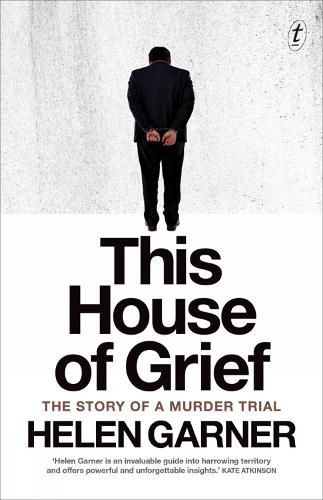Readings Newsletter
Become a Readings Member to make your shopping experience even easier.
Sign in or sign up for free!
You’re not far away from qualifying for FREE standard shipping within Australia
You’ve qualified for FREE standard shipping within Australia
The cart is loading…






$9.00 standard shipping within Australia
FREE standard shipping within Australia for orders over $100.00
Express & International shipping calculated at checkout
It’s difficult to loudly sing the praises of a book that covers such a harrowing subject. I had anticipated the release of Helen Garner’s new non-fiction since early in the year, though the title of the work, in itself, seems to request a hushed reception. On Father’s Day in 2005, a car driven by Robert Farquharson, carrying his three young sons, veered off the highway outside of Winchelsea and plunged into a dam. Farquharson swam to shore, but his children drowned. In This House of Grief, Garner follows the subsequent murder trial, a case that stretched over eight years, and seeks to answer the incomprehensible: was Farquharson’s a deliberate act?
It would be misleading to say this is an enjoyable read, but it ripples with the strength of Garner’s prose: she portrays the courtroom vividly, bringing the parading barristers, Farquharson’s indignant sisters and string of frustrated expert witnesses all piercingly to life. Over the days that I read this book I felt like I sat there with her, behind the scrimmage of journalists, a sullen, sunken Farquharson just beyond my direct gaze. He is perhaps the haziest of characters here – Garner never speaks with him or his immediate family. Though after finishing the book I’m stuck with the image Garner paints of him holding a handkerchief to his wincing, puffed face. Small details like these are riveted to my memory, an effective technique of Garner’s.
It takes time to feel Garner’s point of view. She positions herself as a divorced woman, and this tenders her narration with an interesting perspective as it suggests she might feel sympathy, even just a thread, for the embittered ex-husband. Do we, as readers, feel a flicker of this too? When the murder trial begins, Cindy Gambino, Farquharson’s ex-wife, attests on the stand to belief in his innocence. The narrative turn comes in step with the change in testimony of Gambimo, who, in the retrial three years later, says she now believes Farquharson’s actions were intentional. We are jolted from the semantics of witnesses endlessly going over tyre treads in the grass, or misplaced yellow paint marks made by the Major Collision unit on the bitumen where the car was thought to have left the road, to something that feels closer to a truth, however elusive. This is a gut-wrenching, tense study of a murder trial, brilliant in its precision and perception.
See what the Readings’ team have to say on the blog, discover related events and podcast episodes.
Scandals, cover-ups and lies – uncover the truth with our recommended true crime reads.
Helen Garner is a beloved and critically acclaimed Australian writer of novels, stories, screenplays and works of non-fiction.
On reflection, 2014 was a terrific year for literature. Apart from memorable debuts and soon-to-be celebrated favourites, it was also the most recent time the Booker Prize has been won by an Australian (Richard Flanagan's The Narrow Road to the Deep North) as well as being the peak of the YA boom that swept the pop culture landscape. Below you'll find a selection of great books, many of which are still absolute favourites of our booksellers in 2024, that were first published in 2014.